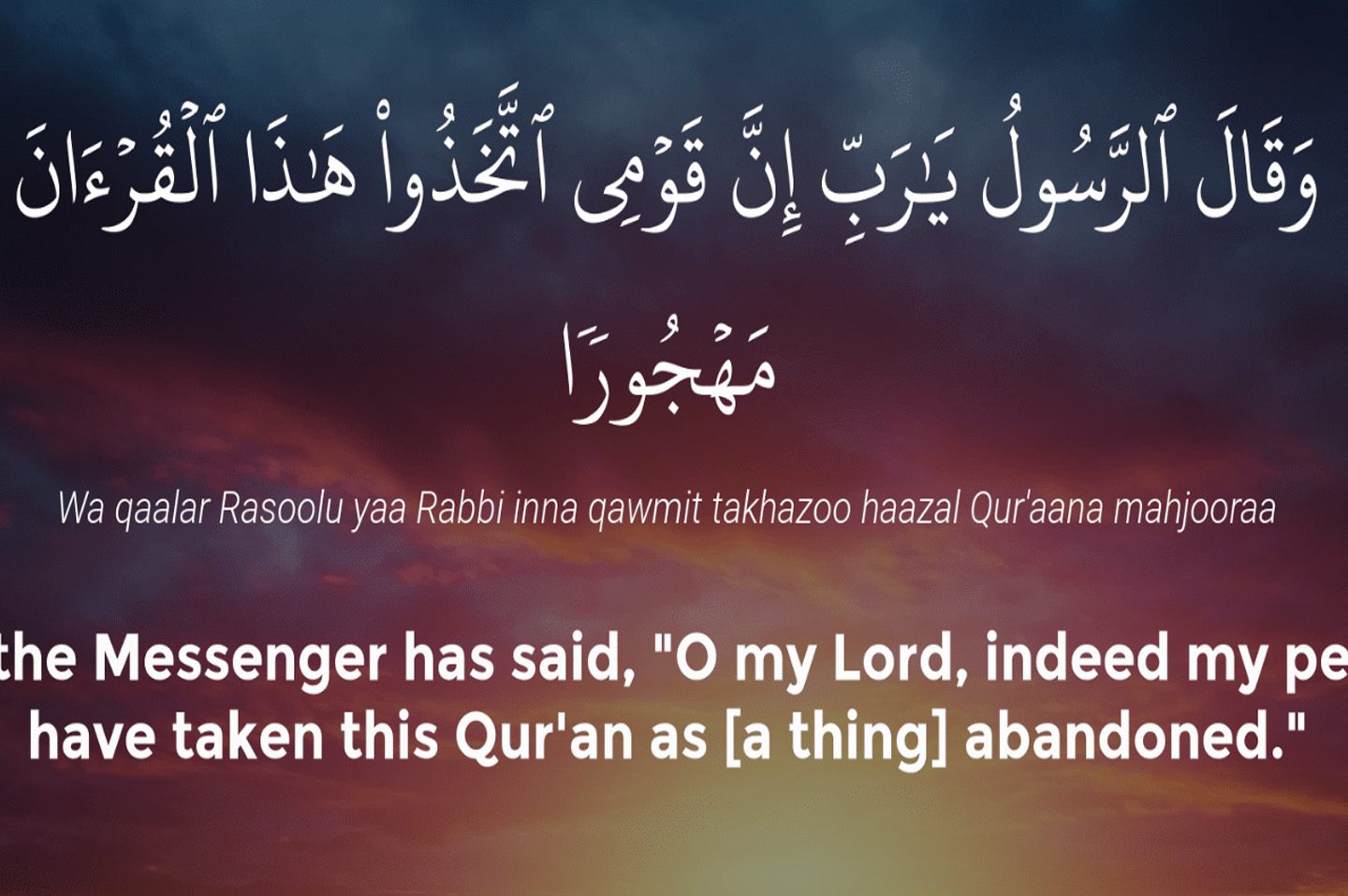وَقَالَ الرَّسُولُ يَا رَبِّ إِنَّ قَوْمِي اتَّخَذُوا هَٰذَا الْقُرْآنَ مَهْجُورًا (الفرقان 30)
(On that Day) the Messenger will say, “My Lord, This Qur’an was abandoned by my people.”
In Surah Al-Furqan, verse 30, the Qur’an profoundly captures the lamentation of Prophet Muhammad (peace be upon him), who says, “My Lord, indeed my people have taken this Qur’an as [a thing] abandoned.” This verse is a poignant reminder of the responsibilities believers hold towards the Qur’an and the transformative role it can play in their lives when actively engaged with.
Context and Meaning
The verse is set in a broader discussion of the struggles faced by the Prophet (peace be upon him) in spreading the message of Islam. His sorrow reflects the tendency of some people to neglect the guidance of the Qur’an, treating it as irrelevant or abandoning its teachings. This neglect can manifest in various forms, from failing to recite the Qur’an regularly to ignoring its meanings or not applying its lessons to daily life.
The Qur’an: A Gift of Divine Love
Allah sent the Qur’an as a divine gift because He values and loves each one of us. It serves as a profound reminder that Allah created humanity out of His immense love, and His guidance is intended to make life on earth better for us while leading us to eternity with Him. The Qur’an is not merely a text; it is a beacon of hope, a source of comfort, and a pathway to spiritual fulfillment.
Allah’s Multilingual Guidance
While the Qur’an was revealed in the Arabic language, Allah, in His boundless wisdom, has ensured that its message transcends linguistic barriers. For those who do not speak Arabic, reading and understanding the Qur’an in their native language is perfectly acceptable. The key is to comprehend the divine guidance and integrate it into daily life. Allah’s love for humanity is evident in His desire for every individual to connect with the Qur’an, regardless of their linguistic background.
The Importance of Daily Engagement
To ensure that the Qur’an is not “abandoned,” believers are called to make it a central part of their lives. This includes not just recitation but also striving to understand its meaning and integrating its principles into their actions. Scholars emphasize that engaging with the Qur’an should be an ongoing process of learning, reflection, and application.
Forms of Neglect
Islamic scholars highlight that abandoning the Qur’an isn’t limited to physical neglect. It extends to:
- Not Reflecting on Its Teachings: Reading without understanding or pondering over its meanings.
- Failure to Act Upon Its Guidance: Knowing what it instructs but not following through.
- Avoiding Its Study: Not making time to learn its interpretations or seek its wisdom in solving life’s challenges.
- Neglecting to use the modern tools of knowledge to have a contemporary understanding of the Qur’an is another for of neglect.
Practical Steps to Reconnect
- Daily Recitation: Setting aside time each day to read a portion of the Qur’an, using the medium that will help you to best understand the meaning.
- Tafsir and Understanding: Studying reputable tafsir (interpretation) to deepen comprehension.
- Finding a good translation of the meaning and reading a portion on daily basis.
- Reflection and Application: Making a conscious effort to reflect on the teachings and applying them to personal and social life.
- Community Learning: Engaging in study groups or listening to scholarly lectures to enrich understanding.
A Timeless Message
This verse serves as a wake-up call, urging Muslims to renew their relationship with the Qur’an and avoid the pitfalls of neglect. It reminds believers that the Qur’an is not merely a text to be revered but a divine guide meant to shape and transform lives.
By ensuring the Qur’an becomes a part of daily life, its transformative power can lead to personal growth, stronger faith, and a deeper connection to the Creator. Through the Qur’an, Allah expresses His love for humanity, guiding us not only in this world but also toward eternal bliss in His presence.
